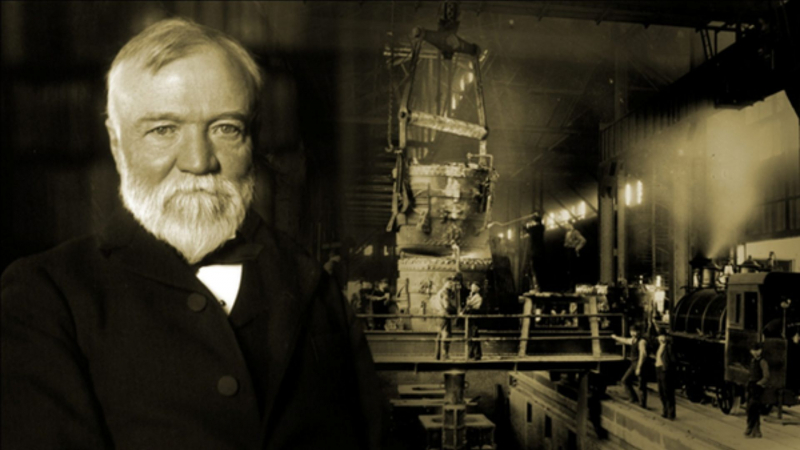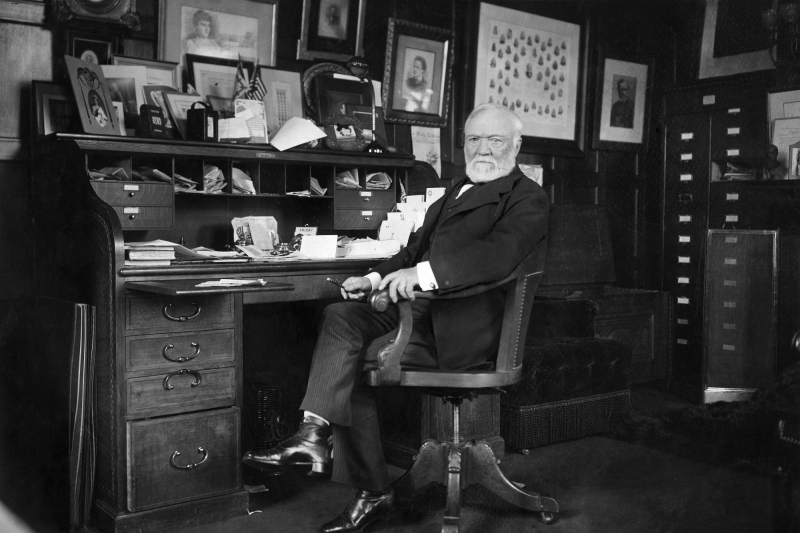Andrew Carnegie

Scottish-born Andrew Carnegie (1835-1919) was an American industrialist who made a fortune in the steel industry before becoming a prominent philanthropist. Carnegie began his career as a child worker in a Pittsburgh cotton industry before advancing to the position of division superintendent of the Pennsylvania Railroad in 1859.
While working for the railroad, he invested in different projects, including iron and oil companies, and by the time he was in his early 30s, he had amassed his first fortune. He entered the steel business in the early 1870s and became a dominant force in the industry during the next two decades. In 1901, he sold the Carnegie Steel Company for $480 million to banker John Pierpont Morgan. Carnegie subsequently turned his attention to philanthropy, eventually donating more than $350 million.
Carnegie co-founded his first steel company near Pittsburgh in the early 1870s. Over the next two decades, he built a steel empire by owning plants, raw materials, and transportation infrastructure involved in steel production, increasing revenues and eliminating inefficiencies. His principal holdings were combined in 1892 to become Carnegie Steel Company.
The steel tycoon saw himself as a defender of the working man, but his reputation was tainted by the Homestead Strike in 1892 at his Homestead, Pennsylvania, steel factory. When union members protested wage cuts, Carnegie Steel general manager Henry Clay Frick (1848-1919), intent to dissolve the union, shut them out of the plant.
During the strike, Andrew Carnegie was on vacation in Scotland, but he supported Frick, who ordered 300 Pinkerton armed guards to safeguard the facility. At least ten men were killed in a brutal clash between striking workers and Pinkertons. The town was then taken over by the state militia, union leaders were jailed, and Frick hired replacement workers for the facility. The strike concluded with the union's loss after five months. Furthermore, for the next four decades, the labor movement in Pittsburgh-area steel factories was devastated.
In 1901, banker John Pierpont Morgan (1837-1913) paid $480 million for Carnegie Steel, making Andrew Carnegie one of the world's richest men. Morgan joined Carnegie Steel with a number of other steel companies the same year to become U.S. Steel, the world's first billion-dollar corporation.
After selling his steel company, Carnegie, who stood 5'3", resigned from business and devoted himself entirely to philanthropy. He wrote an essay called "The Gospel of Wealth" in 1889, in which he asserted that the wealthy have a "moral imperative to share [their money] in ways that promote the well and happiness of the ordinary man." "The man who dies so affluent dies shamed," Carnegie added.
Carnegie eventually handed away $350 million (the equivalent of billions in today's dollars), the majority of his fortune. Among his philanthropic activities, he funded the establishment of over 2,500 public libraries around the world, donated over 7,600 organs to churches around the world, and endowed organizations (many of which are still in operation today) dedicated to research in science, education, world peace, and other causes.
Among his contributions were the $1.1 million needed for the site and building of Carnegie Hall, the famed New York City concert facility that debuted in 1891. His financial contributions helped to establish the Carnegie Institution for Science, Carnegie Mellon University, and the Carnegie Foundation. He was the largest individual investment in public libraries in American history, and he was a book enthusiast.


























